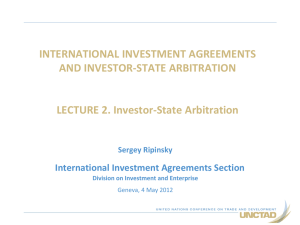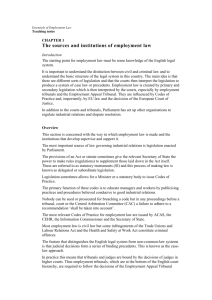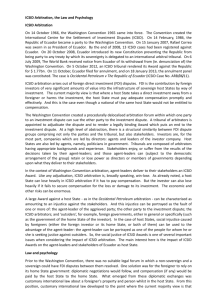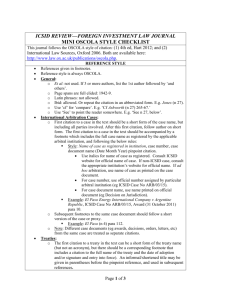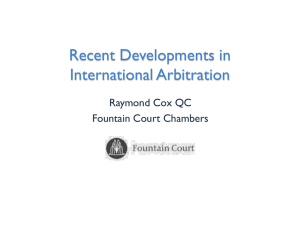The Role of Precedent in ICSID Arbitration
advertisement
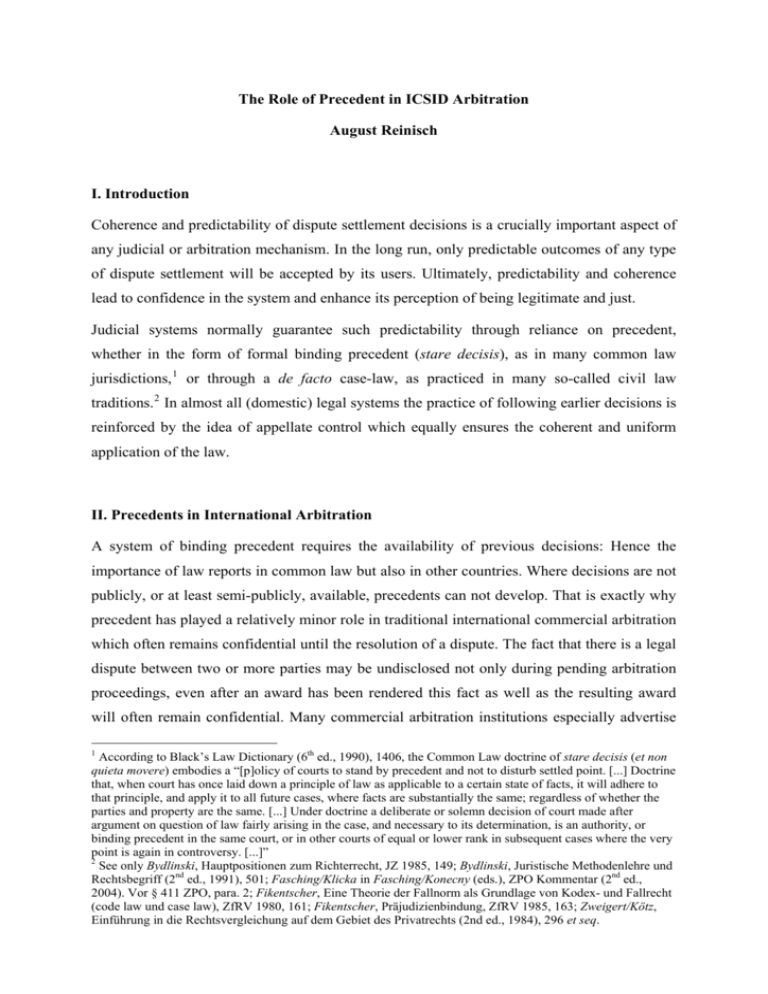
The Role of Precedent in ICSID Arbitration August Reinisch I. Introduction Coherence and predictability of dispute settlement decisions is a crucially important aspect of any judicial or arbitration mechanism. In the long run, only predictable outcomes of any type of dispute settlement will be accepted by its users. Ultimately, predictability and coherence lead to confidence in the system and enhance its perception of being legitimate and just. Judicial systems normally guarantee such predictability through reliance on precedent, whether in the form of formal binding precedent (stare decisis), as in many common law jurisdictions, 1 or through a de facto case-law, as practiced in many so-called civil law traditions. 2 In almost all (domestic) legal systems the practice of following earlier decisions is reinforced by the idea of appellate control which equally ensures the coherent and uniform application of the law. II. Precedents in International Arbitration A system of binding precedent requires the availability of previous decisions: Hence the importance of law reports in common law but also in other countries. Where decisions are not publicly, or at least semi-publicly, available, precedents can not develop. That is exactly why precedent has played a relatively minor role in traditional international commercial arbitration which often remains confidential until the resolution of a dispute. The fact that there is a legal dispute between two or more parties may be undisclosed not only during pending arbitration proceedings, even after an award has been rendered this fact as well as the resulting award will often remain confidential. Many commercial arbitration institutions especially advertise 1 According to Black’s Law Dictionary (6th ed., 1990), 1406, the Common Law doctrine of stare decisis (et non quieta movere) embodies a “[p]olicy of courts to stand by precedent and not to disturb settled point. [...] Doctrine that, when court has once laid down a principle of law as applicable to a certain state of facts, it will adhere to that principle, and apply it to all future cases, where facts are substantially the same; regardless of whether the parties and property are the same. [...] Under doctrine a deliberate or solemn decision of court made after argument on question of law fairly arising in the case, and necessary to its determination, is an authority, or binding precedent in the same court, or in other courts of equal or lower rank in subsequent cases where the very point is again in controversy. [...]” 2 See only Bydlinski, Hauptpositionen zum Richterrecht, JZ 1985, 149; Bydlinski, Juristische Methodenlehre und Rechtsbegriff (2nd ed., 1991), 501; Fasching/Klicka in Fasching/Konecny (eds.), ZPO Kommentar (2nd ed., 2004). Vor § 411 ZPO, para. 2; Fikentscher, Eine Theorie der Fallnorm als Grundlage von Kodex- und Fallrecht (code law und case law), ZfRV 1980, 161; Fikentscher, Präjudizienbindung, ZfRV 1985, 163; Zweigert/Kötz, Einführung in die Rechtsvergleichung auf dem Gebiet des Privatrechts (2nd ed., 1984), 296 et seq. the confidentiality of their proceedings as a distinctive advantage. 3 While this may indeed be in the interest of disputing parties, it clearly implies that the non-availability of awards removes them not only from public (and in particular academic) scrutiny, it also means that these awards cannot form part of a body of case-law upon which subsequent arbitral tribunals may be able to rely. To a certain extent, some arbitration institutions like the International Chamber of Commerce try to compensate this deficiency by editing anonymised versions of awards. 4 III. The Special Nature of Investment Arbitration In many respects, investment arbitration is very close to commercial arbitration, also from a practical point of view: it tends to be conducted by commercial arbitration lawyers and in the way they are used to do it; it is frequently administered pursuant to arbitration rules used in commercial arbitration, such as the ICC, 5 UNCITRAL, 6 SCC, 7 LCIA 8 or other Arbitration Rules. 9 But as a form of so-called mixed arbitration (between private parties and States) investment arbitration possesses certain distinctive features. While in commercial arbitration 3 Cf. the statement of the International Chamber of Commerce on its official arbitration homepage under “More advantages of arbitration”: “In contrast with ordinary courtroom proceedings under public and media gaze, ICC does not divulge details of an arbitration case and keeps the identities of the parties completely confidential. So your business remains nobody else's business. Sometimes, of course, parties will publicize an award – but ICC’s lips are always sealed. If you wish, you may also enter into a confidentiality agreement with the opposing party as an additional safeguard.” Available at http://www.iccwbo.org/court/arbitration/id5327/index.html. 4 See, for instance, Jarvin/Derains (eds.), Collection of ICC Arbitral Awards 1974 – 1985, Vol. I (1990); Jarvin/Derains /Arnaldez (eds.), Collection of ICC Arbitral Awards 1986 – 1990, Vol. II (1994); Arnaldez/Derains/Hascher (eds.), Collection of ICC Arbitral Awards 1991 – 1995, Vol. III (1997); Arnaldez/Derains/Hascher (eds.), Collection of ICC Arbitral Awards 1996 – 2000, Vol. IV (2003). 5 ICC Rules of Arbitration 1998, in ICC (ed.), ICC Rules of Arbitration, Publication No 808 (2001) 6, available at http://www.iccwbo.org/uploadedFiles/Court/Arbitration/other/rules_arb_english.pdf. 6 UNCITRAL Arbitration Rules 1976, 15 International Legal Materials 701 (1976); available at http://www.uncitral.org/english/texts/arbitration/arb-rules.htm. 7 Arbitration Rules of the Arbitration Institute of the Stockholm Chamber of Commerce 2007, available at http://www.sccinstitute.com/_upload/shared_files/regler/2007_Arbitration_Rules_eng.pdf. 8 London Court of International Arbitration, Arbitration Rules 1998, 37 International Legal Materials 669 (1998); available at http://www.lcia-arbitration.com/. 9 See, e.g., Bridas S.A.I.P.I.C., Bridas Energy International, Ltd., Intercontinental Oil & Gas Ventures, Ltd. and Bridas Corporation v. Government of Turkmenistan, Concern Balkannebitgazsenagat and State Concern Turkmenneft, ICC Arbitration Case No. 9058/FMS/KGA, Final Award, 26 January 2001, available at http://ita.law.uvic.ca/documents/BridasICC9058final.pdf; 1. The Channel Tunnel Group Limited 2. FranceManche S.A. v. 1. the Secretary of State for Transport of the Government of the United Kingdom of Great Britain and Northern Ireland 2. le ministre de l’équipement, des transports, de l’aménagement du territoire, du tourisme et de la mer du Gouvernement de la République française, UNCITRAL Partial Award, 30 January 2007, available at http://ita.law.uvic.ca/documents/Eurotunnel-partialaward-eng.pdf; Petrobart Limited v. Kyrgyz Republic, Arb. No. 126/2003, Arbitration Institute of the Stockholm Chamber of Commerce (Energy Charter Treaty), 29 March 2005, available at http://ita.law.uvic.ca/documents/petrobart_kyrgyz.pdf; Occidental Exploration and Production Company v. Republic of Ecuador, LCIA Case No UN 3467, 1 July 2004, available at http://ita.law.uvic.ca/documents/Oxy-EcuadorFinalAward_001.pdf. confidentiality is a particular asset allowing private business partners to settle disputes without public (media) attention, 10 investment arbitration usually involves public interests. To a considerable extent investment tribunals exercise a form of administrative review of governmental acts. 11 Thus, there is an increased need for public scrutiny because public interests are involved and because non-investment issues may be affected. In particular, treaty arbitration on the basis of bilateral investment treaties (BITs) tends to concern governmental decisions taken in the interest of the public12 which may negatively affect foreign investors, constituting indirect expropriation or other violations of investment protection standards, such as fair and equitable treatment, full protection and security and the like. Another reason why it may be more important to rely on precedents in investment arbitration than in commercial arbitration is the relative indeterminacy of the rules and principles to be applied in this field of the law. While commercial arbitration frequently deals with highly technical and well-regulated legal issues, investment tribunals often have to apply the relatively meager set of substantive investment standards contained in international investment agreements. Those vague and highly general standards require judicial and quasijudicial interpretation in order to be actually applied. 13 Indeed, it is the practice of investment tribunals which to a considerable degree “makes” investment law. In this sense investment arbitration is very much a child of public international law dispute settlement where the law is scarce and where the line between “finding” and “making” the law is frequently blurred. International courts and tribunals often have to inquire extensively into establishing the existence of a particular rule of law. IV. The Role of Precedent before International Courts and Tribunals Most international courts and tribunals officially disavow the principle of binding precedent, while at the same time they effectively espouse it. The renunciation of stare decisis probably goes back to the decision taken by the drafters of the Statute of the Permanent Court of International Justice, the predecessor institution of the International Court of Justice (ICJ). It 10 See supra note 3. See Van Harten/Loughlin, Investment Treaty Arbitration as a Species of Global Administrative Law, 17 European Journal of International Law (2006) 121, 146. 12 See Wälde, Transparency, Amicus Curiae Briefs and Third Party Rights, 5 The Journal of World Investment and Trade (2004) 37. 13 Cf. Knahr/Reinisch, Transparency versus Confidentiality in International Investment Arbitration – The Biwater Gauff Compromise, 6 The Law and Practice of International Courts and Tribunals (2007), 97, 111 et seq. 11 unequivocally provided that “[t]he decision of the Court has no binding force except between the parties and in respect of that particular case.” 14 Today’s Statute of the ICJ still contains identical language 15 and similar provisions can be found in other rules of procedure of international dispute settlement institutions.16 Nevertheless, they almost all rely on a de facto case-law whereby they rather faithfully tend to follow their earlier decisions. The ICJ, in particular, is known for almost exclusively citing its own precedent and rarely overruling itself. 17 Other courts and tribunals have equally developed a fairly consistent case-law by invoking their previous rulings not as binding precedent but at least as persuasive authority. 18 The specific character of public international law has facilitated this development. Since judicial decisions are counted among the “subsidiary” sources of public international law 19 they are often relied upon as evidence for the existence of customary international law rules or general principles of law. As the drafters of the Statute of the Permanent Court of International Justice succinctly formulated, “[d]octrine and jurisprudence no doubt do not create law; but they assist in determining rules which exist.” 20 This role of de facto precedents is not limited to the ICJ but can be also found with other international dispute settlement mechanisms. WTO Panels and the WTO Appellate Body, for instance, have been able to develop a rather consistent body of trade law over the last 10+ years. 21 Thus, Lord Denning’s laconic assertion that “international law knows no rule of stare decisis” 22 reflects only part of the more complex truth about the role of precedent in international dispute settlement. The missing part has been acknowledged by Malcolm Shaw who wrote that “while the doctrine of precedent as it is known in the Common Law […] does 14 Article 59 of the Statute of the Permanent Court of International Justice, 19 December 1920, PCIJ (Ser. D) No. 1, 7, 25. 15 Article 59 of the Statute of the International Court of Justice equally provides: “The decision of the Court has no binding force except between the parties and in respect of that particular case.” 16 Cf. Article 33(2) Statute of the International Tribunal for the Law of the Sea, Annex VI to the United Nations Convention on the Law of the Sea (UNCLOS), 10 December 1982; in force 16 November 1994. 17 Cf. Shahabuddeen, Precedent in the World Court (1996); Jennings, The Judiciary, International and National, and the Development of International Law, 45 ICLQ (1996) 9. 18 Cf. Glenn, Persuasive Authority, 32 McGill L.J. (1987) 261. 19 According to Article 38(1)(d) of the Statute of the International Court of Justice, “[t]he Court, whose function is to decide in accordance with international law such disputes as are submitted to it, shall apply […] subject to the provisions of Article 59, judicial decisions and the teachings of the most highly qualified publicists of the various nations, as subsidiary means for the determination of rules of law.” 20 Baron Descamps and Lord Phillimore in the Advisory Committee of Jurists; Permanent Court of International Justice (ed.), Procès-Verbaux of the Proceedings of the Committee of Jurists (1920), 336. 21 Cf. Bhala, The Precedent Setters: De facto stare decisis in WTO Adjudication, 9 Journal of Transnational Law & Policy 1 (1999). 22 Trendex Corp. v. Central Bank of Nigeria, [1977] 2 W.L.R. 356, 365. not exist in international law, one finds that states in disputes and textbook writers quote judgments of the Permanent Court and the International Court of Justice as authoritative decisions.” 23 These authoritative decisions may not be binding precedents but they enjoy a highly persuasive authority which is hard to be disregarded. V. Precedents in ICSID Arbitration It is generally accepted that the decisions of ICSID tribunals, like those of other investment dispute settlement mechanisms, are not legally binding precedents. 24 Still, it becomes increasingly apparent that ICSID tribunals very carefully analyze and rely upon the reasoning employed in previous decisions. In fact, the exclusion of a principle of stare decisis is less pronounced with regard to ICSID decisions compared to other procedural rules. The ICSID Convention merely provides in Article 53(1) that an “award shall be binding on the parties […]” 25 ; it does not expressly limit this binding force to the specific dispute settled through an award. 26 Nevertheless, this provision is generally interpreted as excluding the applicability of the principle of binding precedent in ICSID arbitration. 27 Also ICSID tribunals have repeatedly stressed that they are not formally bound by earlier decisions. A. ICSID Case-Law on Precedents In one of the early annulment cases, the ad hoc Committee in Amco v. Indonesia clearly endorsed the lack of binding precedent by stating that “[n]either the decisions of the International Court of Justice in the case of the Award of the King of Spain nor the Decision 23 Shaw, International Law (4th ed., 1997), 86. Cf. Bjorklund, Investment Treaty Arbitral Decisions as Jurisprudence Constante, in: Picker/Bunn/Arner (eds.), International Economic Law: The State and Future of the Discipline (forthcoming 2008); Cheng, Precedent and Control in Investment Treaty Arbitration, 30 Fordham International Law Journal (2007), 1014; KaufmannKohler, Arbitral Precedent: Dream, Necessity, or Excuse, 23 Arbitration International (No. 4, 2007), 357. 25 Article 53(1) ICSID Convention, Convention on the Settlement of Investment Disputes between States and Nationals of Other States, 18 March 1965, 575 UNTS 159; 4 International Legal Materials 532 (1965). 26 Cf. not only Article 59 of the Statute of the International Court of Justice but also the similarly worded provision of Article 1136 (1) NAFTA, North American Free Trade Agreement between the Government of Canada, the Government of the United Mexican States, and the Government of the United States of America (NAFTA), 17 December 1992, 32 International Legal Materials 289 (1993): “An award made by a Tribunal shall have no binding force except between the disputing parties and in respect of the particular case.” 27 See Schreuer, The ICSID Convention: A Commentary (2001), 1082; Schreuer & Weiniger, Conversations Across Cases – Is there a Doctrine of Precedent in Investment Arbitration? in: Muchlinski/Ortino/Schreuer (eds.), The Oxford Handbook of International Investment Law (forthcoming 2008); also available at http://www.univie.ac.at/intlaw/conv_across_90.pdf. 24 of the Klöckner ad hoc Committee are binding on this ad hoc Committee.” 28 It hastened to add, however, that “the absence […] of a rule of stare decisis in the ICSID arbitration system does not prevent this ad hoc Committee from sharing the interpretation given to Article 52(1)(e) by the Klöckner ad hoc Committee.” 29 A similarly nuanced approach can also be found in the LETCO case where an ICSID tribunal found that though it was “not bound by the precedents established by other ICSID Tribunals, it is nonetheless instructive to consider their interpretations.” 30 Only with the growth of ICSID cases over the last 15 years, the issue of precedent has become a real one. As a matter of practice, ICSID tribunals have started to routinely invoke previous decisions in order to support their reasoning. Empirical studies have demonstrated that with the increase of investment arbitration since the mid-1990s reliance on “precedents” has considerably increased. 31 Moreover, in situations where tribunals felt the need to deviate from earlier ICSID decisions and awards, the issue of their legal value was addressed. A famous instance in this regard is the SGS v. Philippines Decision on Jurisdiction 32 which differed sharply from the previous SGS v. Pakistan jurisdictional decision 33 on the issue of the effect of a so-called umbrella clause. In SGS v. Pakistan the arbitrators rejected the view that “breaches of a contract […] concluded with a State (widely considered to be a matter of municipal rather than international law) are automatically ‘elevated’ to the level of breaches of international law. Having regard to the distinction in principle between breaches of contract and breaches of treaty, contractual claims could only be brought under Article 11 ‘under exceptional circumstances’.” 34 In SGS v. Philippines the tribunal adhered to the traditional view that an umbrella clause “makes it a breach of the BIT for the host State to fail to observe binding commitments, including contractual commitments, which it has assumed with regard to specific investments. But it does not convert the issue of the extent or content of such obligations into an issue of international law.” 35 In rationalizing its divergent interpretation, the SGS v. Philippines tribunal held: 28 Amco v. Indonesia, Decision on Annulment, 16 May 1986, para. 44, 1 ICSID Reports 509, 521. Ibid. 30 LETCO v. Liberia, Award, 31 March 1986, 2 ICSID Reports 346, 352. 31 Cf. Commission, Precedent in Investment Treaty Arbitration: A Citation Analysis of a Developing Jurisprudence, 24 Journal of International Arbitration (No. 2, 2007) 129; Commission, Precedent in Investment Treaty Arbitration: The Empirical Backing, Transnational Dispute Settlement (2007). 32 SGS Société Générale de Surveillance S.A. v. Republic of the Philippines, ICSID Case No. ARB/02/6, Decision on Jurisdiction of 29 January 2004, 8 ICSID Reports 515. 33 SGS Société Générale de Surveillance S.A. v. Islamic Republic of Pakistan, ICSID Case No. ARB/01/13, Decision on Jurisdiction of 6 August 2003, 18 ICSID Review – FILJ 301 (2003); 42 International Legal Materials 1290 (2003). 34 SGS v. Pakistan, supra note 33, para. 172. 35 SGS v. Philippines, supra note 32, para. 128. 29 “The ICSID Convention provides only that awards rendered under it are “binding on the parties” (Article 53(1)), a provision which might be regarded as directed to the res judicata effect of awards rather than their impact as precedents in later cases. In the Tribunal’s view, although different tribunals constituted under the ICSID system should in general seek to act consistently with each other, in the end it must be for each tribunal to exercise its competence in accordance with the applicable law, which will by definition be different for each BIT and each Respondent State. Moreover there is no doctrine of precedent in international law, if by precedent is meant a rule of the binding effect of a single decision. There is no hierarchy of international tribunals, and even if there were, there is no good reason for allowing the first tribunal in time to resolve issues for all later tribunals. It must be initially for the control mechanisms provided for under the BIT and the ICSID Convention, and in the longer term for the development of a common legal opinion or jurisprudence constante, to resolve the difficult legal questions discussed by the SGS v. Pakistan Tribunal and also in the present decision.” 36 An important aspect in the SGS v. Philippines award was the fact that the two applicable BITs differed in their wording. 37 Thus, the SGS v. Philippines tribunal could engage in the wellknown common law-technique of distinguishing. The notion expressed in the SGS v. Philippines award that it was for “each tribunal to exercise its competence in accordance with the applicable law, which will by definition be different for each BIT and each Respondent State,” is reinforced by the emphasis given to the specific facts of each case. Investment tribunals routinely stress the fact that their decisions have to be fact-specific. This reasoning is often employed when tribunals hesitate to lay down general definitions or to provide broad interpretations. 38 However, it can also be found in the context of discussing the relevance of previous cases. For instance, in Enron v. Argentina, the tribunal held: “The Tribunal agrees with the view expressed by the Argentine Republic in the hearing on jurisdiction held in respect of this dispute, to the effect that the decisions of ICSID tribunals are not binding precedents and that every case must be examined in the light of its own circumstances.” 39 36 SGS v. Philippines, supra note 32, para. 97. Article 11 of the Switzerland-Pakistan BIT provided: “Each Contracting Party shall constantly guarantee the observance of the commitments it has entered into with respect to the investments of the investors of the other Contracting Party.” Article X(2) of the Switzerland-Philippines BIT stipulated: “Each Contracting Party shall observe any obligation it has assumed with regard to specific investments in its territory by investors of the other Contracting Party.” 38 For instance, in the Feldman case a NAFTA tribunal stated with regard to indirect expropriation “that each determination under Article 1110 is necessarily fact-specific.” Feldman v. Mexico, ICSID Case No. ARB(AF)/99/1, Award, 16 December 2002, para. 107, 7 ICSID Reports 341. 39 Enron Corporation and Ponderosa Assets, L.P. v. The Argentine Republic, ICSID Case No. ARB/01/3, Decision on Jurisdiction (Ancillary Claim), 2 August 2004, para. 25. 37 This skepticism against the growing role of precedents was forcefully stressed by the dissenting arbitrator in the decision on jurisdiction in Fraport v. Philippines. Emphasizing the different factual and legal background of each case, he held that “[t]he meaning of [the ‘in accordance with the laws of the host State’] requirement is a question of treaty interpretation, and not of precedent or analogy. The meaning must be determined in light of the terms, context, object and purpose of each bilateral investment treaty. The integrity of this interpretative process must not be compromised by the pronouncements of other arbitral tribunals in their interpretation of different treaties in wholly unrelated factual and legal contexts. Other awards or decisions are no more than illustrative of the implications of a standard form of treaty wording. 40 In spite of this cautioning, the general appeal of precedent should not be underestimated. AES v. Argentina, 41 one of the many investment proceedings currently pending against Argentina, is to date the award where the legal relevance of previous ICSID decisions was discussed most extensively. Therein the tribunal reaffirmed the Enron tribunal’s view to the effect that “the decisions of ICSID tribunals are not binding precedents and that every case must be examined in the light of its own circumstances.” 42 It stated: “There is so far no rule of precedent in general international law; nor is there any within the specific ICSID system for the settlement of disputes between one State party to the Convention and the National of another State Party.” 43 Nevertheless, the AES tribunal stressed the factual importance of previous cases by making the following rather detailed remarks: “27. Under the benefit of the foregoing observations, the Tribunal would nevertheless reject the excessive assertion which would consist in pretending that, due to the specificity of each case and the identity of each decision on jurisdiction or award, absolutely no consideration might be given to other decisions on jurisdiction or awards delivered by other tribunals in similar cases. 28. In particular, if the basis of jurisdiction for these other tribunals and/or the underlying legal dispute in analysis present either a high level of similarity or, even more, an identity with those met in the present case, this Tribunal does not consider that it is barred, as a matter of principle, from considering the position taken or the opinion expressed by these other tribunals. 29. In that respect, it should be noted that the US-Argentina BIT, in conjunction with the ICSID Convention, provides the very same basis for the jurisdiction in this case and in some previous ones, as, in particular, those in which Argentina faced or is still facing a dispute with ENRON Corp., CMS, AZURIX Corp, or LG&E and others; in each and every of these cases the tribunals respectively constituted have already delivered their decisions on jurisdiction. 40 Fraport AG Frankfurt Airport Services Worldwide v. Republic of the Philippines, ICSID Case No. ARB/03/25, Decision on Jurisdiction, 16 August 2006, (dissenting opinion Cremades), para 7. 41 AES Corporation v. The Argentine Republic, ICSID Case No. ARB/02/17, Decision on Jurisdiction, 26 April 2005. 42 Enron v. Argentina, supra note 39, para. 25, cited in AES v. Argentina, supra note 41, para. 23. 43 AES v. Argentina, supra note 41, para. 23. 30. An identity of the basis of jurisdiction of these tribunals, even when it meets with very similar if not even identical facts at the origin of the disputes, does not suffice to apply systematically to the present case positions or solutions already adopted in these cases. Each tribunal remains sovereign and may retain, as it is confirmed by ICSID practice, a different solution for resolving the same problem; but decisions on jurisdiction dealing with the same or very similar issues may at least indicate some lines of reasoning of real interest; this Tribunal may consider them in order to compare its own position with those already adopted by its predecessors and, if it shares the views already expressed by one or more of these tribunals on a specific point of law, it is free to adopt the same solution. 31. One may even find situations in which, although seized on the basis of another BIT as combined with the pertinent provisions of the ICSID Convention, a tribunal has set a point of law which, in essence, is or will be met in other cases whatever the specificities of each dispute may be. Such precedents may also be rightly considered, at least as a matter of comparison and, if so considered by the Tribunal, of inspiration. 32. The same may be said for the interpretation given by a precedent decision or award to some relevant facts which are basically at the origin of two or several different disputes, keeping carefully in mind the actual specificities still featuring each case. If the present Tribunal concurs with the analysis and interpretation of these facts as they generated certain special consequences for the parties to this case as well as for those of another case, it may consider this earlier interpretation as relevant. 33. From a more general point of view, one can hardly deny that the institutional dimension of the control mechanisms provided for under the ICSID Convention might well be a factor, in the longer term, for contributing to the development of a common legal opinion or jurisprudence constante, to resolve some difficult legal issues discussed in many cases, inasmuch as these issues share the same substantial features.” 44 Indeed, it would be hard to imagine that the many ICSID tribunals, currently hearing factually similar claims against Argentina which are frequently based on similarly worded or even identical BIT provisions, should not take into account what earlier decisions have held with regard to similar issues. To act otherwise would deprive ICSID dispute settlement of its predictability and thus of an important facet of legal certainty. One may also expect that with the increased use of the ICSID-specific control mechanism of annulment proceedings under Article 52(1) ICSID Convention, 45 a body of case-law will emerge similar to what happened in the context of WTO-jurisprudence resulting from decisions of the Appellate Body. It is this potential development which the AES tribunal alludes to when it found that “the institutional dimension of the control mechanisms provided for under the ICSID Convention might well be a factor, in the longer term, for contributing to the development of a common legal opinion or 44 AES v. Argentina, supra note 41, paras. 27-33. Article 52(1) ICSID Convention provides: “Either party may request annulment of the award by an application in writing addressed to the Secretary-General on one or more of the following grounds: (a) that the Tribunal was not properly constituted; (b) that the Tribunal has manifestly exceeded its powers; (c) that there was corruption on the part of a member of the Tribunal; (d) that there has been a serious departure from a fundamental rule of procedure; or (e) that the award has failed to state the reasons on which it is based.” 45 jurisprudence constante, to resolve some difficult legal issues discussed in many cases, inasmuch as these issues share the same substantial features.” 46 The practice of developing a kind of de facto case-law has been nicely characterized in the Gas Natural case 47 where the tribunal emphasized: “[…] that it has rendered its decision independently, without considering itself bound by any other judgments or arbitral awards. Having reached its conclusions, however, the Tribunal thought it useful to compare its conclusion with the conclusions reached in other recent arbitrations conducted pursuant to the ICSID Arbitration Rules and arising out of claims under contemporary bilateral investment treaties. We summarize a few of these decisions here, and confirm that we have not found or been referred to any decisions or awards reaching a contrary conclusion.” 48 On the basis of such a practice of de facto cross-checking the decisions of other investment tribunals, it is no longer surprising to find some tribunals, such as the 2006 Suez tribunal, 49 to refer to the increasing number of BIT arbitrations as “a growing jurisprudence of arbitral decisions interpreting treaty provisions.” 50 The relevance of previous arbitral decisions interpreting BIT provisions was aptly summarized by the ICSID tribunal in ADC v. Hungary 51 in the following way: “The Parties to the present case have also debated the relevance of international case law relating to expropriation. It is true that arbitral awards do not constitute binding precedent. It is also true that a number of cases are fact-driven and that the findings in those cases cannot be transposed in and of themselves to other cases. It is further true that a number of cases are based on treaties that differ from the present BIT in certain respects. However, cautious reliance on certain principles developed in a number of those cases, as persuasive authority, may advance the body of law, which in turn may serve predictability in the interest of both investors and host States.” 52 Indeed, the law of indirect expropriation has been a particularly promising field for the concretization of rather vague general standards through investment arbitration 53 and thus has 46 AES v. Argentina, supra note 41, para. 33. Gas Natural SDG, S.A. v. The Argentine Republic, ICSID Case No. ARB/03/10, Decision on Jurisdiction, 17 June 2005. 48 Gas Natural, supra note 47, para. 36. 49 Suez, Sociedad General de Aguas de Barcelona S.A., and InterAguas Servicios Integrales del Agua S.A. v. The Argentine Republic, ICSID Case No. ARB/03/17, Decision on Jurisdiction, 16 May 2006. 50 Suez v. Argentina, supra note 49, para. 50. 51 ADC Affiliate Limited and ADC & ADMC Management Limited v. Republic of Hungary, ICSID Case No. ARB/03/16, Award, 2 October 2006. 52 ADC v. Hungary, supra note 51, para. 293. It may seem an ironic twist of stare decisis that in a NAFTA decision, Fireman’s Fund v. Mexico, these words were exactly copied with the only variation that the word “BIT” was replaced by the word “NAFTA.” There is no reference, however, to the origin of the language in ADC v. Hungary. Fireman’s Fund Insurance Company v. United Mexican States, ICSID Case No. ARB(AF)/02/1 (NAFTA), Award, 17 July 2006, para. 172. 53 Cf. Reinisch, Expropriation, in: Muchlinski/Ortino (eds.), The Oxford Handbook of International Investment Law (OUP). ILA Committee on the International Law on Foreign Investment (forthcoming); pre-published version available http://www.ila-hq.org/pdf/Foreign%20Investment/ILA%20paper%20Reinisch.pdf. 47 proven correct Christie’s prediction “that the question of what kind of interference short of outright expropriation constitutes a ‘taking’ under international law presents a situation where the common law method of case by case development is pre-eminently the best method, in fact probably the only method, of legal development.” 54 In a similar way, investment tribunals tend to closely examine and try to follow the “precedents” set by earlier tribunals with regard to the interpretation of other, often vague, general investment standards, such as fair and equitable treatment, full protection and security or the non-discrimination standards usually contained in BITs. 55 The attempts to arrive at a uniform or at least consistent interpretation of investment law received a serious set-back by the LG&E v. Argentina 56 tribunal. In its 2006 decision on liability, this ICSID tribunal did not only ignore the findings of the CMS v. Argentina 57 tribunal rendering its award only a year earlier; it also arrived at a result squarely contradicting the earlier decision. 58 The CMS v. Argentina tribunal found that the situation prevailing in Argentina between 2001 and 2003 was not grave enough to qualify as necessity under the strict requirements of Article 25 of the ILC Draft Articles. Though it regarded the situation as having been “severe” it did not acknowledge its “relative effect” to be sufficient for a finding of necessity exempting it from liability. 59 The LG&E v. Argentina tribunal, on the other hand, concluded that the situation in Argentina during a 15-months period between 2001 and 2003 constituted a state of necessity, exempting the respondent State of its responsibility for violating various investment standards under the Argentina-US BIT. 60 What is particularly irritating in the LG&E case is the fact that the tribunal did not take the earlier CMS decision into consideration when discussing the necessity issue. While it briefly 54 Christie, What Constitutes a Taking of Property Under International Law? 38 The British Yearbook of International Law (1962) 307, 338. 55 See in detail Cheng, supra note 24, 1035 et seq. 56 LG&E Energy Corp., LG&E Capital Corp., LG&E International Inc. v. The Argentine Republic, ICSID Case No. ARB/02/1, Decision on Liability, 3 October 2006, 46 International Legal Materials 40 (2007). 57 CMS Gas Transmission Company v. The Argentine Republic, ICSID Case No. ARB/01/8, Award, 12 May 2005, 44 International Legal Materials 1205 (2005). 58 See in more detail Reinisch, Necessity in International Investment Arbitration – An Unnecessary Split of Opinions in Recent ICSID Cases? Comments on CMS and LG&E, 8 The Journal of World Investment and Trade (2007), 191. 59 CMS v. Argentina, supra note 57, paras. 320, 321: “The Tribunal is convinced that the crisis was indeed severe and the argument that nothing important happened is not tenable. However, neither could it be held that wrongfulness should be precluded as a matter of course under the circumstances. As is many times the case in international affairs and international law, situations of this kind are not given in black and white but in many shades of grey. It follows that the relative effect that can be reasonably attributed to the crisis does not allow for a finding on preclusion of wrongfulness.” See also the subsequent statement at CMS v. Argentina, supra note 57, para. 355: “The Tribunal is convinced that the Argentine crisis was severe but did not result in total economic and social collapse.” 60 LG&E v. Argentina, supra note 56, para. 257: “The essential interests of the Argentine State were threatened in December 2001. It faced an extremely serious threat to its existence, its political and economic survival, to the possibility of maintaining its essential services in operation, and to the preservation of its internal peace.” referred to the discussion of the fair and equitable treatment standard by the CMS tribunal, 61 the LG&E tribunal did not take any notice of the CMS decision on necessity at all, though CMS had been rendered almost 18 months earlier and had been made publicly available. 62 This neglect is all the more surprising given the fact that one of the arbitrators on the two tribunals was identical 63 and that both tribunals discussed expert opinions provided by the same legal experts. 64 This confusion about the availability of the necessity defence to Argentina was not really settled by a third ICSID tribunal assessing the same economic crisis. In Enron v. Argentina 65 a tribunal, ironically again comprising one arbitrator who had already sat on the LG&E tribunal, 66 found “that the requirements of the state of necessity under customary international law [had] not been fully met in this case.” 67 Without expressly mentioning either the CMS or the LG&E award, the Enron tribunal simply found that the crisis was not severe enough to qualify as necessity. 68 It remains to be seen which line will be followed in future Argentina cases. For the sake of the ICSID system’s acceptance it is to be hoped that tribunals will engage in a more thorough discussion of earlier decisions on this issue. In the Saipem v. Bangladesh case an ICSID tribunal attempted to summarize how such an engagement could look like. It characterized the high relevance of previous decisions, short of binding precedent, in the following way: “The Tribunal considers that it is not bound by previous decisions. At the same time, it is of the opinion that it must pay due consideration to earlier decisions of international tribunals. It believes that, subject to compelling contrary grounds, it has a duty to adopt solutions established in a series of consistent cases. It also believes that, subject to the specifics of a given treaty and of the circumstances of the actual case, it has a duty to seek to contribute to the harmonious development of investment law and 61 LG&E v. Argentina, supra note 56, para. 125, footnote 30. CMS v. Argentina was rendered on 12 May 2005, made available on various investment arbitration related homepages shortly thereafter and published in the September 2005 issue of International Legal Materials, see supra note 57. 63 ICJ Judge Francisco Rezek served as party-appointed arbitrator both in the CMS and the LG&E case, in both cases he was appointed by Argentina. 64 Both in the CMS and the LG&E case, Dean Ann-Marie Slaughter and Professor José Alvarez submitted legal opinions on the issue of necessity. Cf. CMS v. Argentina, supra note 57, para. 334. LG&E v. Argentina, supra note 56, paras. 29, 30. 65 Enron Corporation Ponderosa Assets, L.P. v. The Argentine Republic, ICSID Case No. ARB/01/3, Award, 22 May 2007. 66 Albert Jan van den Berg was a party-appointed arbitrator both in the LG&E and the Enron case. The irony is even heightened by the fact that in LG&E he was appointed by the claimant investor, while in Enron he was the substitute appointee for the arbitrator appointed by Argentina. 67 Enron v. Argentina, supra note 65, para. 313. 68 Enron v. Argentina, supra note 65, para. 306, 307: “The Tribunal has no doubt that there was a severe crisis and that in such context it was unlikely that business could have continued as usual. Yet, the argument that such a situation compromised the very existence of the State and its independence so as to qualify as involving an essential interest of the State is not convincing. […] there is no convincing evidence that the events were out of control or had become unmanageable.” 62 thereby to meet the legitimate expectations of the community of States and investors towards certainty of the rule of law.” 69 B. Reflections on the Relevance of ICSID Precedents The above survey of awards and decisions addressing the issue of precedents in investment arbitration demonstrates that tribunals are increasingly aware of this issue. It also shows that they largely agree on the basic premise that there is no legal obligation to follow earlier arbitral decisions in the sense of strict stare decisis. Nevertheless, there is a consistent tendency of ICSID tribunals to take into account and to discuss earlier investment awards when rendering their decisions. This has led to a kind of de facto case-law system whereby tribunals routinely rely upon previous decisions and discuss them as quasi-authoritative manifestations of the law. If tribunals disagree with the outcome of previous arbitral decisions, they tend to distinguish them instead of formally deviating from them. 70 Thus, inconsistent outcomes are seldom the result of open conflict. 71 Rather, they may stem from a more or less inadvertent oversight 72 or they may be explained on the basis of the fact that tribunals have to interpret different BITs or other investment agreements with often different wording. 73 Statistically, however, such inconsistent arbitral decisions have been rare exceptions to the general rule that tribunals seek to follow previous decisions. Out of the total number of ICSID decisions which rely upon ICSID and other precedents only a few address the issue of the legal relevance of such “precedents”, Thus, the above cited examples from the case-law of ICSID tribunals only reflect the rising awareness of tribunals 69 Saipem S.p.A. v. The People’s Republic of Bangladesh, ICSID Case No. ARB/05/07, Decision on Jurisdiction, 21 March 2007, para. 67. 70 See, for instance, the controversial assessment whether an MFN-clause extends to dispute settlement provisions – as initially suggested in Emilio Agustín Maffezini v. Kingdom of Spain, ICSID Case No. ARB/97/7, Decision on Jurisdiction, 25 January 2000, 40 International Legal Materials 1129 (2001) – or is limited to substantive treatment standards depends to a considerable degree on the precise wording of the applicable MFNclause – as forcefully stressed in Plama Consortium Limited v. Republic of Bulgaria, ICSID Case No. ARB/03/24, Decision on Jurisdiction, 8 February 2005, 44 International Legal Materials 721 (2005). In the Suez case, the tribunal disagreed with the Plama decision in the following way: “Having duly considered the reasons set forth in the Plama decision, this Tribunal comes to the conclusion that, whatever its merits, it is in any event clearly distinguishable from the present case on a number of grounds.” Suez v. Argentina, supra note 49, para. 63. 71 See, however, the SGS v. Philippines case, supra text at note 32. 72 See the LG&E v. Argentina case, supra note 56, where it is hard to believe that the tribunal really overlooked the earlier CMS v. Argentina decision, supra note 57. However, the short time span of only a week between the the Final Award in the Matter of an UNCITRAL Arbitration: Ronald S. Lauder v. The Czech Republic, 3 September 2001, reprinted in: 14 World Trade and Arbitration Materials 35 (2002), and the UNCITRAL Arbitral Tribunal: CME Czech Republic B.V. v. The Czech Republic, Partial Award (13 September 2001), reprinted in: 14 World Trade and Arbitration Materials 109 (2002), makes it understandable that the latter tribunal was unable to discuss the earlier decision. 73 See Suez v. Argentina, supra note 49, para. 63. of the role of precedents in investment arbitration; they do not adequately reflect the far broader actual practice of the use of precedents in investment arbitration.74 What is remarkable is the fact that the cases actually addressing the issue of stare decisis rarely deal with the doctrinal issue of why such a system of binding precedent does not apply. As discussed above, the exclusion of stare decisis is less explicit in the ICSID Convention than in other procedural rules. 75 Nevertheless, ICSID tribunals have taken “the absence […] of a rule of stare decisis in the ICSID arbitration system” 76 for granted. 77 Only the tribunal in SGS v. Philippines openly addressed the question of the true meaning of Article 53(1) of the ICSID Convention by stating that this “provision […] might be regarded as directed to the res judicata effect of awards rather than their impact as precedents in later cases.” 78 Thorough discussions of the underlying policy rationales are also rare. Mostly, policy reasons in favour of following precedents are implicit. Sometimes, however, they are expressly mentioned such as the rule of law element of legal certainty furthered by a consistent case-law in the Saipem decision on jurisdiction 79 or the need of predictability in the interest of both investors and host States mentioned in the ADC v. Hungary award. 80 Clearly the idea of “a common legal opinion or jurisprudence constante” as expressed in the SGS v. Philippines case 81 and later on endorsed in AES v. Argentina 82 is also based on the concept of legal security furthered through a consistent case-law. In general, doctrinal or policy discussions are rare. More frequently, tribunals emphasize the practical relevance of considering “precedents” as a “useful” 83 or “instructive” 84 source of “inspiration” 85 or guide to finding the law. 86 Investment law “precedents” are followed, not because of any intrinsic binding value, but rather as a result of their “persuasive” force. It is the strength of the argument expressed in an award or decision that will command adherence. 74 For an empirical study of the use of precedent in investment arbitration, see Commission, Precedent in Investment Treaty Arbitration: A Citation Analysis of a Developing Jurisprudence, supra note 31. 75 See supra text at note 26. 76 Amco v. Indonesia, supra note 28, para. 44. 77 See also LETCO v. Liberia, supra note 30, 352; Enron v. Argentina, supra note 39, para. 25; AES v. Argentina, supra note 41, para. 23; ADC v. Hungary, supra note 51, para. 293; Saipem v. Bangladesh, supra note 69, para. 67. 78 SGS v. Philippines, supra note 32, para. 97. See also full cite supra note 36. 79 Saipem v. Bangladesh, supra note 69, para. 67. 80 ADC v. Hungary, supra note 51, para. 293. 81 SGS v. Philippines, supra note 32, para. 97. 82 AES v. Argentina, supra note 41, para. 33. 83 Gas Natural v. Argentina, supra note 47, para. 36. 84 LETCO v. Liberia, supra note 30, at 352. 85 AES v. Argentina, supra note 41, para. 31. 86 See also the ICSID Additional Facility tribunal in Feldman v. Mexico, stating that it “sought guidance in the decisions of several earlier NAFTA Chapter 11 tribunals that have interpreted Article 1110.” Feldman v. Mexico, ICSID Case No. ARB(AF)/99/1, Award, 16 December 2002, 7 ICSID Reports 341, para. 107. This notion has been clearly expressed in the Eureko v. Poland case, 87 where an ad hoc tribunal had to decide which SGS decision it would follow in the interpretation of an umbrella clause. In considering the analysis of both tribunals, the Eureko tribunal sided with SGS v. Philippines 88 finding its reasoning “cogent and convincing” as opposed to the approach of the SGS v. Philippines which it characterized as “less convincing.” 89 Another more recent ICISD decision, which endorsed the contrary view following the SGS v. Pakistan 90 finding, emphasized the formal authority of the precedent-setting previous tribunals. In El Paso v. Argentina, 91 the tribunal concluded that in its view, “following the important precedents set by Tribunals presided over by Judge Feliciano, Judge Guillaume and Professor Orrego Vicuna, an umbrella clause cannot transform any contact claims into a treaty claim […]” 92 VI. Conclusion Based on the existing pronunciations by ICSID tribunals on the role of precedent a fairly clear picture emerges. While tribunals consistently reject the notion of legally binding precedent in the form of stare decisis they attempt to adhere to previous decisions rendered by ICSID and other investment tribunals, thus developing a de facto case-law. Even where they refrain from explicitly addressing the issue of precedent, ICSID tribunals actually rely upon previous decisions in shaping an ever more elaborate body of investment law. 87 Eureko B.V. v. Republic of Poland, Partial Award, 19 August 2005, available at http://ita.law.uvic.ca/documents/Eureko-PartialAwardandDissentingOpinion.pdf. 88 SGS v. Philippines, supra note 32. 89 Eureko v. Poland, supra note 87, para. 257. 90 SGS v. Pakistan, supra note 33. 91 El Paso Energy Int’l Co. v. The Argentine Republic, ICSID Case No. ARB/03/15, Decision on Jurisdiction, 27 April 2006. 92 Ibid., para. 82. Similarly, Pan American Energy LLC v. The Argentine Republic, ICSID Case No. ARB/04/8, Decision on Jurisdiction, 27 April 2006.
